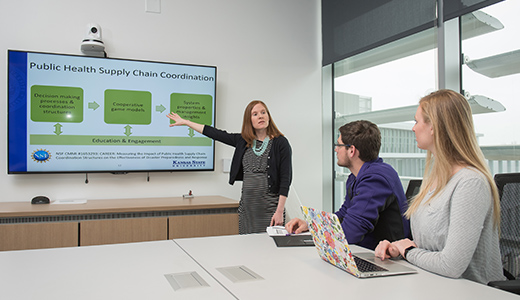Keystone Scholar funding helps provide research opportunities to change the world
When you hear that someone has earned an industrial engineering degree, most people do not think that humanitarian efforts can be tied to it. For Keystone Research Faculty Scholar recipient and associate professor Jessica Heier Stamm, her passion has become making the connection of industrial engineering and humanitarian efforts a reality.
While Jessica was an undergraduate studying industrial engineering, she learned about operations research and saw a great opportunity to combine what she was studying with her passion for making a difference in people’s lives.
Operations research is the application of mathematical models to analyze complex problems to better understand business problems and generate solutions. “Here is a way to use math to represent a real world system, and get an answer from the math about the best way to design or manage that system,” Jessica said.
What she has found in her students is that most people can relate to disasters and their significance. “Most have experienced some kind of disaster themselves, know someone who has, or have seen pictures of major events,” Jessica said. The students understand the need for effective humanitarian logistics but have no idea how to tie that into their industrial engineering degree.
That is where Jessica’s research comes in. Her research has been able to directly impact the way health care and public health organizations in Kansas manage supply chain decisions for disaster preparedness. Her research has led to an understanding of how to better ensure that sufficient supplies are available to respond when a disaster event occurs.
“I talk about the challenges associated with preparing for, responding to, and recovering from disasters and the opportunity to reduce adverse impacts by making good decisions informed by data,” Jessica said.
Jessica’s team works to answer two central research questions: What is the impact on a system’s effectiveness as a result of decentralization — where decisions are made by individual units based on local information instead of having decisions made from a central source based on the full scope of available data? And how can systems be designed to mitigate adverse effects of decentralization?
Thinking big picture, this means Jessica and her team are advancing knowledge about how coordination between stakeholders can improve overall outcomes in humanitarian and public health systems. “The most common response I hear when I describe my work is ‘I didn’t know industrial engineers do that.’” said Jessica.
Keystone Research Faculty Scholar awards are supported by private donations to help recruit and retain sought-after faculty. Having previous records of outstanding research accomplishment, faculty members are nominated by their department head for these positions. As a recipient of the Keystone Scholar funding, Jessica says the funds “make it possible to support additional researchers in my group, including a graduate student and postdoctoral scholar. The funding also enables group members to participate in interdisciplinary conferences.”
Overall, the funding has increased the visibility, productivity and impact of her work, making it possible for Jessica and her team to continue to improve the way the public health organizations operate for disaster preparedness.
Jessica’s research does not just impact the outside world, it impacts K-State students in the classroom. “I encourage students to think about how they want to change the world. What problems are important to them,” said Jessica. “That is the great thing about industrial engineering; we learn to design and improve systems, so no matter what system is important to you, there is a way to use these skills to make a difference in that domain.”




